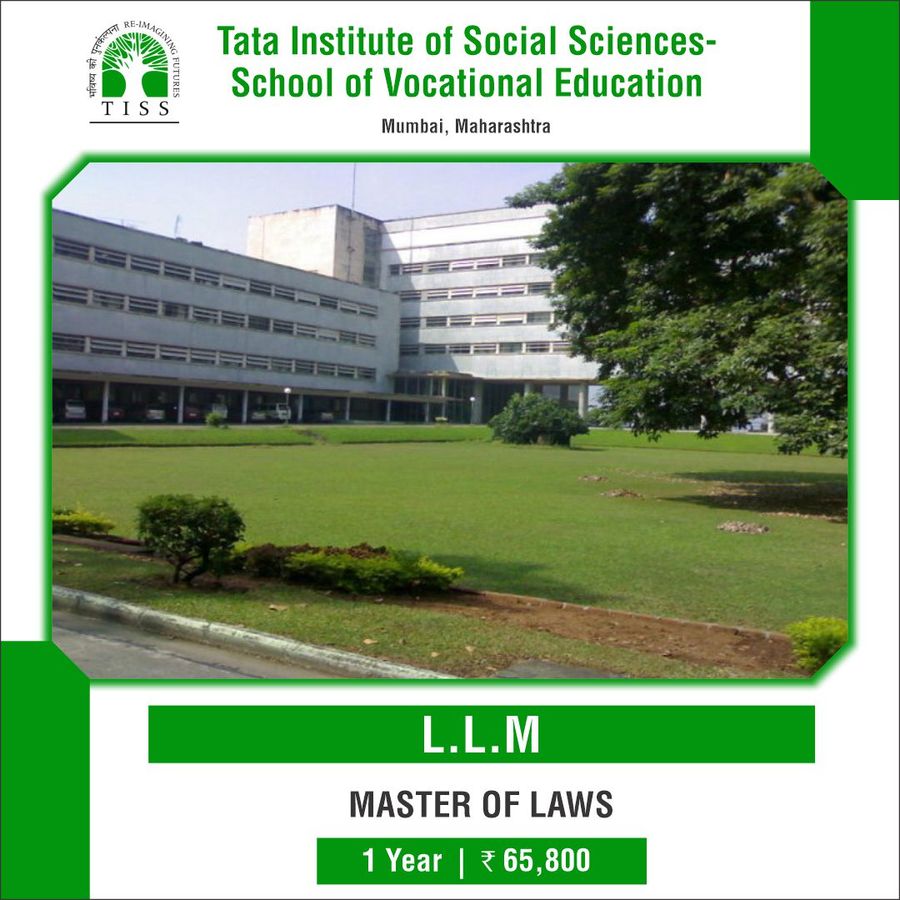


Master of Laws (LL.M) in Access to Justice
Law (LLM)
Shortlisted by 94+ Students
Location: Mumbai
Duration: 1 YEAR
Regular / Offline
Average Fees: ₹ 81000
Highlights Access to law and justice is the hallmark of any civilised and caring society—a basic necessity in a democracy governed by the rule of law, which is supreme. Access to Justice means being treated fairly according to the law and if you are not treated fairly, being able to get appropriate redress. It also means making access to law less complex and everyone having some basic understanding of their rights. Access to justice includes not only access to courts and legal redress mechanisms, but also good governance including transparency and accountability in the making of laws and process of their implementation and administration. The current justice delivery system is perceived as expensive, time-consuming, procedure-ridden, technical and difficult to comprehend, which prevents the poor and vulnerable groups from approaching the legal system to redress their grievances. Complex laws and procedures, an expensive system to deal with the huge backlog of cases, delays in delivering justice, and corruption are some of the challenges to accessing justice. The laws, legal institutions and processes need to be reformed so that they are more responsive to the needs of all citizens, particularly the vulnerable and marginalised groups and individuals in the society. There is an urgent need to create a cadre of conscientious and socially committed lawyers to transform the justice system. It is in this context, a programme to develop socially committed legal professionals assumes significance. The one-year, full time, Master’s degree programme in Law (LL.M) aims at developing legal professionals with greater skills, sensitivity and commitment to deliver basic, high quality legal services to the poor, marginalised and vulnerable groups in society.











![Bachelor of Education [B.Ed] + Master of Education [M.Ed] at Tata Institute of Social Sciences - School of Vocational Education, Mumbai](https://promilo-prod.s3.ap-south-1.amazonaws.com/Tata Institute of Social Sciences - School of Vocational Education -Mumbai/logo/logo.png)
![Master of Arts [M.A] at Tata Institute of Social Sciences - School of Vocational Education, Mumbai (All Areas)](https://promilo-prod.s3.ap-south-1.amazonaws.com/Tata Institute of Social Sciences - School of Vocational Education -Mumbai/logo/logo.png?v=1769681672909)
![Master in Hospital Administration [MHA] at Tata Institute of Social Sciences - School of Vocational Education, Mumbai](https://promilo-prod.s3.ap-south-1.amazonaws.com/Tata Institute of Social Sciences - School of Vocational Education -Mumbai/logo/logo.png)
![Bachelor of Legal Science [B.L.S] + Bachelor of Law [LLB] at Government Law College (Glc), Mumbai](https://promilo-prod.s3.ap-south-1.amazonaws.com/campaign/2c9f8a727d74cc84017d8df9574107e2/Untitled design (11).png)
![Bachelor of Business Administration + Bachelor of Laws [BBA.LLB] at Mumbai University, Mumbai](https://promilo-prod.s3.ap-south-1.amazonaws.com/Mumbai University/logo/logo.png)
Tata Institute of Social Sciences (TISS) - School of Vocational Education
Tata Institute of Social Sciences (TISS) The Tata Institute of Social Sciences, a multi-campus institution, deemed to be University under Section 3 of the UGC Act 1956 and a grant-in-aid Institute under Ministry of Education, Government of India, was established in 1936. In India as in other parts of the world, TISS occupies a unique position among institutes of higher learning as an institution of excellence that continues to respond to the changing social realities through the development of knowledge and its applications toward the creation of a people-centred, ecologically sustainable, and just society that promotes and protects dignity, equality, social justice, and human rights. TISS is a Grade One University, with NAAC accreditation scoring of 3.33 with a letter grade of A+, and peaking at 98th/58th rank at the overall/university ranking of The National Institutional Ranking Framework (NIRF, 2024).
School of Skill Education (SSE)
The School was established in 2011 to spearhead the Institute's commitment to provide specialized skill education and training to millions of youth in India through appropriately designed industry relevant/market oriented skill educational programmes. The core vision of the School is to help young people develop skills/gain sustainable incomes by skilling them in key industrial job competencies that would enable them to find better jobs, live better lives, and ultimately contribute to the economic growth of the nation.
The Outcomes of Master of Laws (LL.M) in Access to Justice:
For the welfare of the general public, understanding the law and society is very much essential in a democratic polity. Being a democratic polity, India is bound to construct a relationship between law and society, in which legislation and policy-making should respond truly to the needs of the society. This also means that equitable access to justice must be provided through the four institutions of Indian democracy-the legislature, the executive, the judiciary, and the media as the fourth estate. The course aimed at such needs of access to justice. Hence, the need for accessing justice equally was emphasized through the interdisciplinary LLM course at TISS. All these four limbs of the Indian democratic set have vehemently opposed any form of denial to equitable access to justice; however, there is still a lot left to be done. The lack of awareness of their basic rights and, above that, a majority of the marginalized vulnerable sections that can remove the barriers to accessing justice is still there. Hence promoting those legal aspects of equitable access to justice becomes pertinent in sensitizing the lawyers and people. The course deals with the socio-economic-political domains and contemporary developments in the transition and transformation of the nation.
College Search Made Easy, Find the Right College for You in Minutes, Not Months!
Discover courses, internships, and jobs that sync with your goals.
Get access to premium features and connect directly with experts. You're all set!
Schedule a free online meeting or talk to experts Jump into a meeting with pro-experts. We got you!
Your time is valuable, and we appreciate every moment you spend with us. That's why we continue to reward you for your engagement.